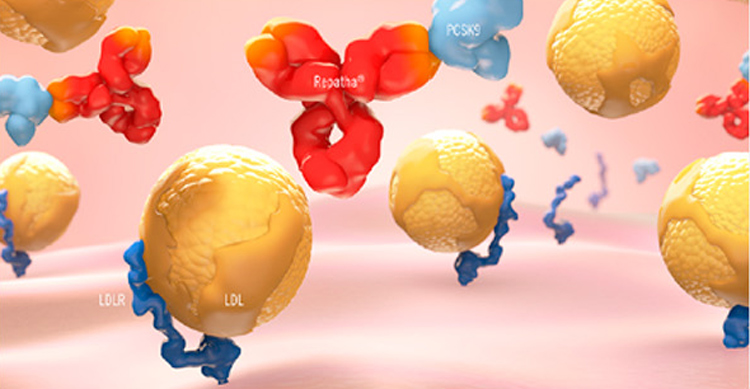
28th March 2017 New drug can dramatically cut bad cholesterol A new drug, evolocumab, is shown to reduce bad cholesterol by 59%.
Coronary heart disease is the single biggest killer worldwide – causing over 7 million deaths each year – and "bad" LDL-cholesterol is a major cause. Statins can reduce the risk of heart disease, but they are not tolerated by everyone and only reduce cholesterol by a certain amount. This month, the results of a major clinical trial have shown that a new cholesterol-lowering drug could further reduce the risk of heart attack or stroke for those already taking statins. The study of evolocumab (trade name Repatha) is published in the New England Journal of Medicine. This looked at over 27,500 patients in 49 countries living with heart disease and taking statins. The drug was found to lower cholesterol by an average of 59% and reduced the risk of a heart attack by 27% and stroke by 21% in the two years of follow-up. Repatha is a human monoclonal antibody that inhibits PCSK9, an enzyme encoded by the PCSK9 gene. Repatha binds to PCSK9 and prevents it from binding to the Low-Density Lipoprotein Receptor (LDL-R), increasing the number of LDL-Rs available to clear bad cholesterol from the blood. "It is much more effective than statins," said Prof. Peter Sever, from Imperial College London, a member of the study's executive committee. "It is probably the most important trial result of a cholesterol-lowering drug in over 20 years." "This trial is a significant advance," said Prof. Sir Nilesh Samani, Medical Director at the British Heart Foundation. "Giving patients evolocumab, a PCSK9 inhibitor, on top of statins, not only helped to further reduce LDL-cholesterol, but also reduced the risk of cardiovascular events in people already affected by heart disease, without causing major side effects." "We now have definitive data that by adding evolocumab to a background of statin therapy, we can significantly improve cardiovascular outcomes and do so safely," said Dr Marc Sabatine, of Harvard Medical School in Boston. "We need to treat LDL cholesterol more aggressively, and now we have a new validated means to do so." ---
Comments »
|







